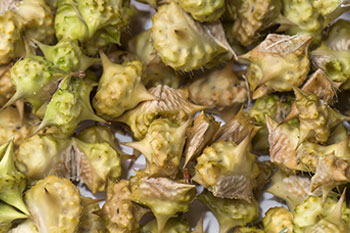
Tribulus Terrestris
(trĭb′yə-ləs təˈrestrēs) n. 1. A genus of chiefly tropical or subtropical herbs (family Zygophyllaceae) introduced into North America with pinnate leaves and yellow or white flowers succeeded by a spiny or prickly fruit of five indehiscent tuberculate carpels. Synonyms: Goat's-head, bindii, bullhead, burra gokharu, Bhakhdi, caltrop, cat's-head, devil's eyelashes, devil's-thorn, devil's-weed, puncture vine, puncturevine, tackweed. Derivation: New Latin Tribulus (genus name), from Latin tribolus, from Greek tribolos.Source
Tribulus terrestris is an herb in the Zygophyllaceae family. It grows in North America, Australia, Africa and Asia in the regions with cool, dry climates.Benefits
Tribulus terrestris helps increase testosterone and lutropin levels in the blood. Research shows that it helps strengthen the immune system, improves endurance and influences muscular growth. Components of tribulus have a positive effect on the cardiovascular system, regulate myocardial contraction power, improve circulation, and dilate blood vessels. Studies show that it influences the level of masculine testosterone in the blood.Uses
Muscle building and improved strength and endurance are the most common uses for tribulus terrestris. Research performed by ACTA MEDICA LITUANICA showed that athletes increased performance in the following areas when using tribulus:- Strength
- Anaerobic alactic muscle power
- Muscle contraction
- VO2 max
- Lung ventilation
- Blood circulation
- Respiratory system capacity
- And testosterone
Forms (delivery methods)
Liquid, capsule, powder, and tablet form.Side Effects
Tribulus supplements are considered safe when taken by mouth. Women that are pregnant or breastfeeding should not take tribulus. It may decrease blood sugar levels, therefore, people taking diabetes medication should speak with their doctor about a possible adjustment.
Research:1 Efficacy of the Tribulus food supplement used by athletes (PDF)
